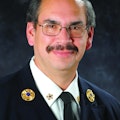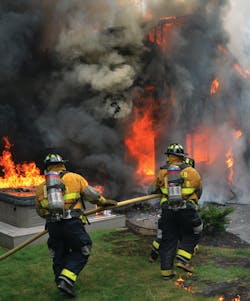Editor’s Note: The Firehouse staff wanted to share some of long-time Editor in Chief Harvey Eisner’s work. Harvey, a fixture on New York City firegrounds and at major events and conferences since the 1970s, passed away on Oct. 23. He was 59. He has worked with Firehouse since its inception in 1976. He began serving with the Tenafly, N.J., Fire Department in 1975 and served as chief for 12 years.
I write this editorial on the eve of 9/11/13. It has been 12 years since the most tragic day in the FDNY and the U.S. fire service and one of the darkest days in the nation’s history.
Right after 9/11, a great number of Americans placed firefighters on a pedestal. No matter where you lived, worked or played, firefighters enjoyed more than their 15 minutes of fame. The public thought firefighters could do no wrong. Donations, sympathy and a new appreciation for what we do on the part of the public allowed firefighters to reach new levels of public respect. Politicians and union officials across the county negotiated raises and benefits for firefighters to make up for low raises or inaction in the past. A firefighter who lost eight members from his company on 9/11 told me at the time that this was not good, because when you are on top, there is nowhere to go but down.
Firefighters were being hired, staffing issues were being addressed and John and Mary Q. Public didn’t seem to care one bit as the economy was in good order. For the most part, people were buying and selling houses, buying cars and SUVs and big-screen TVs. Then, the economy took a nose dive. Private-sector workers were being laid off or going without pay raises. The public sector took a hit too – fire departments were forced to lay off members, close firehouses and fire companies, freeze wages and stop hiring.
The incidence of fires has gone down over the past few decades, but today’s fires burn hotter and emit more dangerous toxins than ever, requiring a response with enough resources to mitigate the problem. Yes, the focus of fire departments has changed, adding hazardous material responses, EMS and technical rescues to their services. That said, a basic engine company today located anywhere must be ready to respond to everything from a rubbish fire to a nuclear incident.
Now, the U.S. fire service has to play catch-up and tell the American public what firefighters do each and every day. In these tough economic and political times, many people are now pointing fingers at the fire service (and government employees in general) over firefighter pay, benefits and staffing. Today, millions of people who have been laid off, are out of work and have little money or maybe even no job are looking at government employees – looking at how much they are paid, how much they make in overtime (even though they work hard for it) and at their comparatively generous pensions. Yes, it is more cost effective, to a point, to pay employees overtime instead of hiring more workers, but the public still points a finger and some are questioning the fire ser service’s growing involvement in EMS.
The reason firefighters respond to EMS and other emergencies is that they have better response times and often are closer to the scene than EMS units. That’s why the firefighters were sent in the first place. Another reason was that EMS in many areas couldn’t keep up with workload.
The number of fires is down in many communities, so some in the media are questioning fire department staffing levels and, in some cases, accusing firefighters and their unions of taking on EMS responsibilities only to preserve jobs. But who do they think should respond to the dozens of different calls that firefighters mitigate each day?
It is more important than ever for fire departments to market themselves to the public in their voting districts. For years, we have been publishing articles, posting online commentaries and offering seminars by Contributing Editor Ben May on how to market your fire department. Now that firefighters are hearing the public outcry, they need to get on board and do the marketing job they should have been doing all along. Many of those who were silent after 9/11, and even some who were our loudest supporters, are ganging up on us now and won’t stop until they force more cuts in government spending. The time for the fire service to act is right now, not a minute later, before the fire service is decimated. The fire service can make a difference; it just needs to sell it better.
Remember, the fire service still makes house calls. Always has and always will.
For comments and suggestions, please contact us at [email protected].
79
2013 firefighter line-of-duty deaths at press time
1,630
2013 civilian fire fatalities at press time
About the Author

Harvey Eisner
Editor Emeritus
HARVEY EISNER was named Editor Emeritus of Firehouse® after serving 15 years as Firehouse's Editor-in-Chief. He joined the Tenafly, NJ, Fire Department in 1975 and served as chief of department for 12 years. He was a firefighter in the Stillwater, OK, Fire Department for three years while attending Oklahoma State University. Eisner was an honorary assistant chief of the FDNY and program director for the Firehouse Expo, Firehouse World and Firehouse Central conferences. He covered many major fires and disasters and interviewed numerous fire service leaders for Firehouse®
